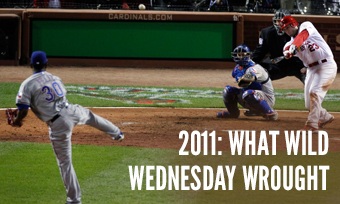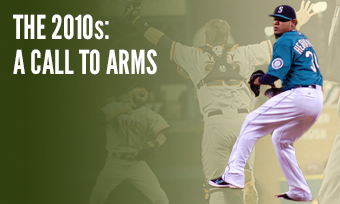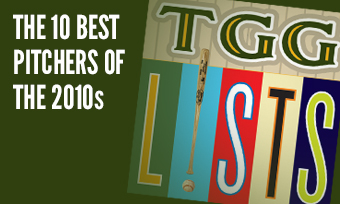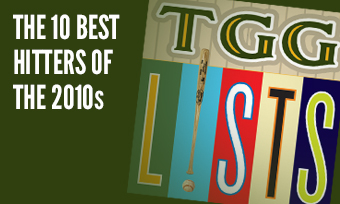The Yearly Reader
Leaders and Honors, 2011
Our list of baseball’s top 10 hitters and pitchers in both the American League and National League for the 2011 baseball season, as well as the awards and honors given to the game’s top achievers of the year.
The National League’s Top 10 Hitters, 2011
Bold type in brick red indicates league leader.
1. Matt Kemp, Los Angeles
Key Numbers: .324 average, 115 runs, 195 hits, 33 doubles, 39 home runs, 126 RBIs, 24 intentional walks, 40 stolen bases.
A year after being distracted by internal criticism and an external dalliance with pop star Rihanna, Kemp refocused on baseball and finished second in the NL MVP vote to Ryan Braun—who we know did it chemically.
2. Ryan Braun, Milwaukee
Key Numbers: .332 average, 109 runs, 187 hits, 38 doubles, 6 triples, 33 home runs, 111 RBIs, 33 stolen bases, 6 caught stealing, .597 slugging percentage.
Braun’s excellent year was temporarily soured by a positive steroid test that was later overturned on a technicality by an arbitrator; the Biogenesis scandal, two years later, would make the stain permanent.
3. Prince Fielder, Milwaukee
Key Numbers: 162 games, .299 average, 95 runs, 170 hits, 36 doubles, 38 home runs, 120 RBIs, 107 walks, 32 intentional walks, 10 hit-by-pitches.
In his final year with the Brewers, Fielder tied Cecil Cooper for the most 100-RBI seasons in franchise history (with four), but seemed to spend most of his energy constantly restraining hotheaded teammate Nyjer Morgan from starting a brawl.
4. Joey Votto, Cincinnati
Key Numbers: .309 average, 101 runs, 185 hits, 40 doubles, 29 home runs, 103 RBIs, 110 walks, 20 grounded into double plays, .416 on-base percentage.
Votto drew over 100 walks for the first time in his career, as fans began to wonder if he was starting to be too patient at the plate.
5. Justin Upton, Arizona
Key Numbers: .289 average, 105 runs, 171 hits, 39 doubles, 5 triples, 31 home runs, 88 RBIs, 19 hit-by-pitches, 21 stolen bases.
The stirring outfielder helped elevate Arizona from worst-to-first in the NL West while producing that rarest of event: A broken-bat home run.
6. Lance Berkman, St. Louis
Key Numbers: .301 average, 90 runs, 31 home runs, 94 RBIs, 92 walks.
Looking to be on the outs after a substantive decline among multiple teams the year before, Berkman recharged and gathered a well-earned World Series ring at age 35.
7. Carlos Gonzalez, Colorado
Key Numbers: 127 games, .295 average, 92 runs, 27 doubles, 26 home runs, 92 RBIs, 20 stolen bases.
In his second year with the Rockies hampered by multiple injuries, Gonzalez ramped up after a modest start, setting a Rockies record with an 11-game RBI streak.
8. Troy Tulowitzki, Colorado
Key Numbers: .302 average, 81 runs, 36 doubles, 30 home runs, 105 RBIs.
In a relatively pain-free year, the chronically hobbled shortstop didn’t display the usual Jekyll/Hyde-like splits so typical of a Rockies player; he hit .310 at home and .292 on the road.
9. Albert Pujols, St. Louis
Key Numbers: .299 average, 105 runs, 173 hits, 29 doubles, 37 home runs, 99 RBIs, 29 grounded into double plays.
For the first time in his 10-year career—and his last with the Cardinals—Pujols failed to hit .300 or knock in 100 runs; he finished, respectively, at .299 and 99.
10. Jose Reyes, New York
Key Numbers: 126 games, .337 average, 101 runs, 181 hits, 31 doubles, 16 triples, 7 home runs, 44 RBIs, 39 stolen bases.
The Mets’ dynamic sparkplug had the ghost of season triples record-holder Chief Wilson (36 in 1912) looking over his shoulder for half the season as he racked up 15 of his 16 three-baggers before the end of June.
The American League’s Top 10 Hitters, 2011
1. Jose Bautista, Toronto
Key Numbers: .302 average, 105 runs, 43 home runs, 103 RBIs, 132 walks, 24 intentional walks, .608 slugging percentage.
Bautista’s 2010 breakout performance was based on his power, as he entered the 2011 season with a career .244 batting average; that went up after a more complete showing.
2. Miguel Cabrera, Detroit
Key Numbers: 161 games, .344 average, 111 runs, 197 hits, 48 doubles, 30 home runs, 105 RBIs, 108 walks, 22 intentional walks, 24 grounded into double plays, .448 on-base percentage.
Entering the season’s last week trailing Adrian Gonzalez in the batting race by seven points, Cabrera collected 15 hits over his final 26 at-bats to take his first of three straight AL titles.
3. Jacoby Ellsbury, Boston
Key Numbers: .321 average, 660 at-bats, 119 runs, 212 hits, 46 doubles, 5 triples, 32 home runs, 105 RBIs, 39 stolen bases.
Ellsbury unexpectedly turned up the power and provided a pleasant silver lining in Boston’s bust of a season; he had the highest MVP vote total among players not named Verlander.
4. Curtis Granderson, Detroit
Key Numbers: .262 average, 136 runs, 26 doubles, 10 triples, 41 home runs, 119 RBIs, 85 walks, 12 hit-by-pitches, 25 stolen bases.
One would expect Granderson, a leadoff-type with added muscle, to score a bunch of runs—but no one expected 41 homers. He became only the second AL player since 1979 to lead the league in both runs and RBIs.
5. Adrian Gonzalez, Boston
Key Numbers: .338 average, 108 runs, 213 hits, 45 doubles, 27 home runs, 117 RBIs, 20 intentional walks, 28 grounded into double plays.
In his first year at Boston, Gonzalez didn’t display the monster power many expected but, otherwise, no one was complaining; he also asked the Padres, his former employer, how they liked him now after going 8-for-14 in three interleague games against them.
6. Robinson Cano, New York
Key Numbers: .302 average, 104 runs, 188 hits, 46 doubles, 7 triples, 28 home runs, 118 RBIs, 12 hit-by-pitches.
Cano was Charlie Gehringer’s Mechanical Man personified; once again, he popped a .300-plus average with 100-plus runs, 40-plus doubles, 20-plus homers and 100-plus RBIs. (Bonus fact: He was a surprise winner in the Home Run Derby.)
7. Adrian Beltre, Texas
Key Numbers: 124 games, .296 average, 82 runs, 33 doubles, 32 home runs, 105 RBIs.
It’s a shame that the first-year Ranger pulled his hamstring, costing him 40 days of play; otherwise after July 1, he hit a smokin’ .367 with 18 home runs and 48 RBIs in just 42 games.
8. Dustin Pedroia, Boston
Key Numbers: .307 average, 102 runs, 195 hits, 37 doubles, 21 home runs, 91 RBIs, 86 walks, 26 stolen bases.
The no-nonsense second baseman came as close to matching his 2008 AL MVP numbers; he hit .344 after June 4.
9. Josh Hamilton, Texas
Key Numbers: 121 games, .298 average, 80 runs, 31 doubles, 5 triples, 25 home runs, 94 RBIs.
A tough, bittersweet but still productive follow-up to a 2010 MVP campaign saw Hamilton miss nearly two months to a broken arm, lob a foul ball to a firefighter who fell to his death trying to catch it, and play an instrumental role in a second straight Texas pennant.
10. Michael Young, Texas
Key Numbers: .338 average, 88 runs, 213 hits, 41 doubles, 6 triples, 11 home runs, 106 RBIs.
Young, again, was asked to move on the field to accommodate a new arrival (in this case, Adrian Beltre) and understandably griped—then settled down as the DH and gave the Rangers a huge lift towards another pennant.
The National League’s Top 10 Pitchers, 2011
1. Clayton Kershaw, Los Angeles
Key Numbers: 2.28 ERA, 21 wins, 5 losses, .808 win percentage, 33 starts, 233.1 innings, 248 strikeouts, 14 stolen bases allowed, 18 caught stealing/picked off.
Hey Freak, there’s a new star in town: Kershaw won all four of his head-to-head battles against two-time reigning Cy Young winner Tim Lincecum on his way to his own first Cy honor and ERA crown.
2. Roy Halladay, Philadelphia
Key Numbers: 2.35 ERA, 19 wins, 6 losses, .760 win percentage, 32 starts, 8 complete games, 233.2 innings, 35 walks.
Always in midseason form, Halladay led his league for the seventh (and last) time in complete games, ran up a streak of 63 consecutive road starts pitching at least six innings (longest since Walter Johnson) and became the first pitcher to earn All-Star Game starts for both leagues.
3. Cliff Lee, Philadelphia
Key Numbers: 2.40 ERA, 17 wins, 8 losses, .680 win percentage, 32 starts, 6 complete games, 6 shutouts, 232.2 innings, 42 walks, 238 strikeouts, 20 grounded into double plays.
Cliff Lee turned down the Yankees because his wife hated their fans, returned to Philadelphia and put together two consecutive scoreless-inning streaks of over 30 innings.
4. Ian Kennedy, Arizona
Key Numbers: 2.88 ERA, 21 wins, 4 losses, .840 win percentage, 33 starts, 222 innings, 11 wild pitches.
In what would be an up-and-down career, the young right-hander would never be more up than in 2011 with career bests in wins, innings and ERA.
5. Johnny Cueto, Cincinnati
Key Numbers: 2.31 ERA, 9 wins, 5 losses, 24 starts, 156 innings, 10 hit-by-pitches, 18 grounded into double plays.
The evolving right-hander gave up more than three runs in only two of his 24 starts; had he time for one more outstanding start, he might have snuck the ERA title away from Clayton Kershaw.
6. Matt Cain, San Francisco
Key Numbers: 2.88 ERA, 12 wins, 11 losses, 33 starts, 221.2 innings.
The working-man pitcher who seemed eternally cursed by poor support—he entered the 2011 season with a below-.500 career record—barely slipped above water despite just 3.45 runs per start, matching his lifetime ERA coming into the season.
7. Craig Kimbrel, Atlanta
Key Numbers: 2.10 ERA, 4 wins, 3 losses, 46 saves, 8 blown saves, 79 appearances, 77 innings.
The unanimous choice for NL Rookie of the Year honors, easily beating out teammate Freddie Freeman; he didn’t allow a run over 39 straight innings, the third longest such stretch in Braves history.
8. Cole Hamels, Philadelphia
Key Numbers: 2.79 ERA, 14 wins, 9 losses, 31 starts, 216 innings, 44 walks, 23 stolen bases allowed.
Oh, to play in the NL West: Hamels was 6-1 with a 1.32 ERA in eight starts against the left-coast division.
9. Drew Storen, Washington
Key Numbers: 2.75 ERA, 6 wins, 3 losses, 43 saves, 5 blown saves, 73 appearances, 75.1 innings.
The on-again, off-again closer for the Nationals during the early 2010s, Storen was definitely on with a career-high total in saves before elbow issues sidelined him for the first half of 2012.
10. John Axford, Milwaukee
Key Numbers: 1.95 ERA, 2 wins, 2 losses, 46 saves, 2 blown saves, 74 appearances, 73.2 innings.
The tall, slender, mean-throwing Axford took over for a retired Trevor Hoffman and especially enjoyed the home cooking of Miller Park—where he saved 30 games with a 1.15 ERA.
The American League’s Top 10 Pitchers, 2011
1. Justin Verlander, Detroit
Key Numbers: 2.40 ERA, 24 wins, 5 losses, .828 win percentage, 34 starts, 250 strikeouts, 251 innings, 2 balks.
Verlander became the first starting pitcher since Roger Clemens, in 1986, to win the MVP; he was also the fourth hurler to win the triple crown of pitching and throw a no-hitter in the same season. (Christy Mathewson, Sandy Koufax and Bob Feller were the others.)
2. Jered Weaver, Los Angeles Angels of Anaheim
Key Numbers: 2.41 ERA, 18 wins, 8 losses, .692 win percentage, 33 starts, 235.2 innings.
Weaver hit the stellar heights of ace stardom, but a mediocre home stretch (4.27 ERA over his last nine starts) ruined a chance at the ERA crown and deny Justin Verlander the triple crown.
3. James Shields, Tampa Bay
Key Numbers: 2.82 ERA, 16 wins, 12 losses, 33 starts, 11 complete games, 4 shutouts, 249.1 innings, 6 stolen bases allowed, 17 caught stealing/picked off, 21 grounded into double plays.
Shields turned iron for the Rays and became the first pitcher this century to record double-digit complete game totals.
4. CC Sabathia, New York
Key Numbers: 3.00 ERA, 19 wins, 8 losses, .704 win percentage, 33 starts, 237.1 innings, 24 grounded into double plays.
Sabathia just missed out on his second straight 20-win campaign, failing to get the W in either of his final three starts. This career peak would gradually begin to descend due to age, arm overuse…and alcoholism.
5. Jose Valverde, Detroit
Key Numbers: 2.24 ERA, 2 wins, 4 losses, 49 saves, 0 blown saves, 75 appearances, 72.1 innings, 9 stolen bases allowed.
When the save was on the line, no one was better than Valverde, who converted all 49 of his opportunities for Detroit.
6. Doug Fister, Seattle-Detroit
Key Numbers: 2.83 ERA, 11 wins, 13 losses, 31 starts, 216.1 innings, 37 walks, 12 hit-by-pitches.
Definitely a tale of two seasons for the 6’8” right-hander; a 3-12 start with a 3.33 ERA and atrocious run support average (2.4) for Seattle, followed by an 8-1 mark and 1.79 ERA for Detroit—with twice the run support.
7. C.J. Wilson, Texas
Key Numbers: 2.94 ERA, 16 wins, 7 losses, .696 win percentage, 34 starts, 223.1 innings, 10 hit-by-pitches, 24 stolen bases allowed, 31 grounded into double plays.
Once the Rangers’ closer, Wilson continued his successful transition to the rotation—but people couldn’t help but point out that because he was charged with the loss in the All-Star Game, the Rangers had to play the final two games of their fateful World Series in St. Louis, not Arlington.
8. Dan Haren, Los Angeles of Anaheim
Key Numbers: 3.17 ERA, 16 wins, 10 losses, 34 starts, 238.1 innings, 33 walks, 21 stolen bases allowed.
The ever-reliable (if not star-laden) Haren led the AL with a 5.8 strikeout/walk ratio.
9. Justin Masterson, Cleveland
Key Numbers: 3.21 ERA, 12 losses, 10 losses, 33 starts, 216 innings, 11 hit-by-pitches.
Authoring a career-best ERA, Masterson provided an unexpected saving grace for a Cleveland rotation that otherwise checked in at 4.89. In his other seven big-league seasons, his ERA would be 4.55.
10. Brandon McCarthy, Oakland
Key Numbers: 3.32 ERA, 9 wins, 9 losses, 25 starts, 5 complete games, 170.2 innings, 25 walks.
Recovering well from a year-long absence due to shoulder issues, McCarthy signed with the A’s, brought more efficient movement to his pitches, and went the distance in five of his starts—ironically, losing four of them.









